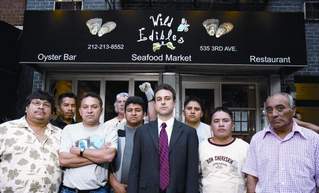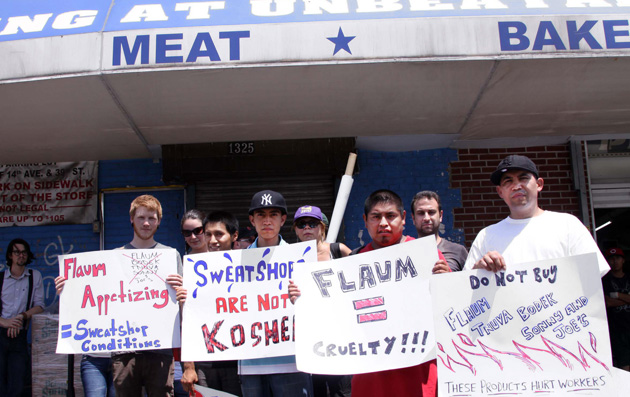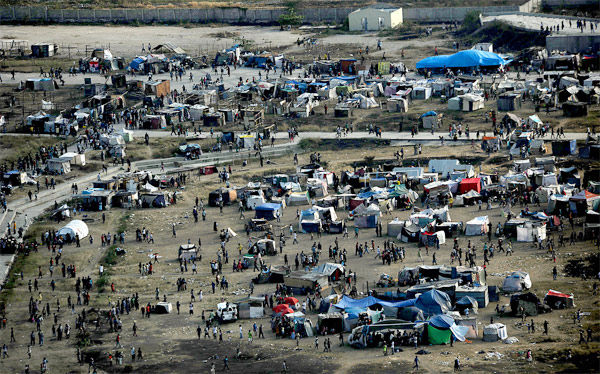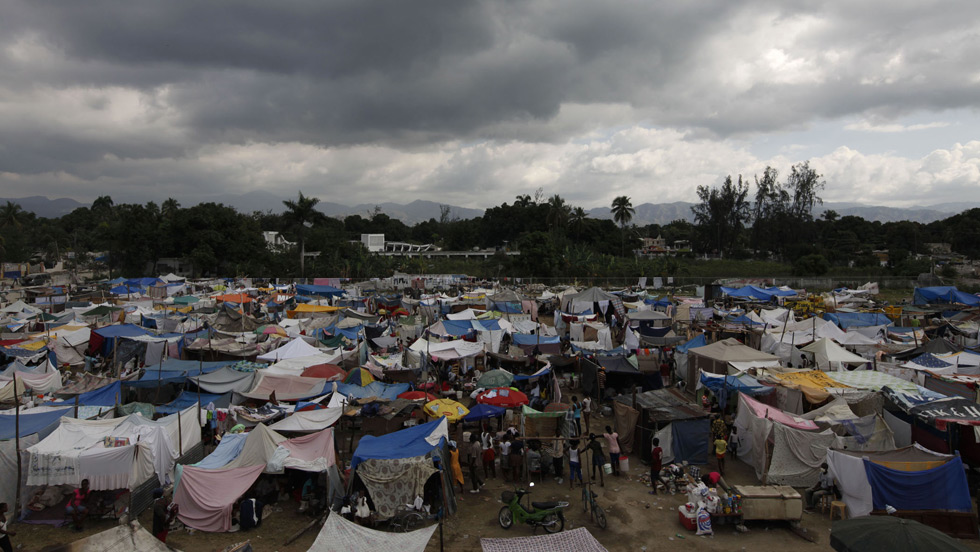Podcast: Play in new window | Download
Updates:
- “Know Your Rights” booklet from the National Lawyers Guild
- Michael Ratner Interview in the ISR: Obama’s National Security State
- British Settlement with Guantanamo Prisoners: Leveraged Against Disclosure of Court Ordered Documents
- Serious Criminal Investigations Ongoing In Europe
- TSA Back Scatter Scanner Machines and Groping
- Former Homeland Security Secretary: Chertoff Group Ties To Full Body Scanners
- Trial begins in Austria for case of slain Chechen
- Manfred Novak – UN Special Rapporteur on Torture, “Is the World Completely Hopeless?”
——-
Brandworkers Defeats Anti-Speech Legal Action from the Flaum Appetizing Corp.
Workers of the Campaign for Justice at Flaum Appetizing Corporation stand up. Immigrants for Mexico and Ecuador challenged sweatshop conditions at a New York City processor and distributor of kosher foods. The workers used innovative legal advocacy and organizing tools to win justice at the company. The company Flaum Appetizing illegally withheld hundreds of thousands of dollars in compensation owed to the workers and used anti-immigrant retailiation when workers stood up for their rights.
- Brandworkers work on a joint campaign called Focus on the Food Chain.
- Much of the food that we consume at markets and restaurants is distributed by a corridor of sweatshops that line southern Queens and northern Brooklyn.
- Overtime is hardly ever paid, no retirement benefits, no health care, extreme discrimination, extremely heavy work without appropriate health and safety standards.
- The company owes them 260 thousand in this labor board case after a full trial.
- The employer had the chance to make their case, call their witnesses, they lost. That order has been enforced, but Flaum is still resisting. They’re resisting for one reason. Immigration.
- We’ve had members there at Flaum, no question where they’re from, say no to abuse, say no to conditions where Latino workers are called cockroaches.
- It’s despicable, we need to put all our energy and all our heart into opposing this type of discrimination.
- Brandworkers: We’re very pleased to report we stared down their Taft-Hartley charges at the board.
- December 8th, 2010 at the Labor Board of Brooklyn / 2 Metro Tech Center / Brooklyn, NY /
- Focus On The Food Chain / Facebook
Guest – Daniel Gross, attorney, co-founder and executive director of Brandworkers International, a non-profit organization protecting and advancing the rights of retail and food employees.
—
It’s been almost a year since Haiti’s catastrophic earthquake took the lives of nearly 200 thousand people and left 1.5 million homeless. Now, women and girls living in the camps have lived in fear of the constant threat of rape and violence.
Groups of attorneys and advocates for displaced women in Haiti are calling for urgent action to confront an epidemic of sexual violence in the camps. On-the-ground investigations have revealed a shocking pattern of rape, beatings and threats against the lives of Haitan women and girls. A petition submitted by the groups to the the Inter-American Commission on Human Rights calls for the IACHR to require the Haitian government to take action such as installing lighting in the camps and provide housing.
Bill Quigley, Legal Director of the Center for Constitutional Rights, said “The ultimate solution here is permanent, safe housing for Haitians. Unfortunately, the international community has reneged on its commitment to provide essential funds for rebuilding and the U.S., in particular, has not delivered even one cent of the reconstruction funding it pledged. Women are being forced to live in extremely unsafe conditions for the foreseeable future and it is a deplorable failure on the part of those who made such a show about standing with the Haitian people in their greatest hour of need.”
- I was in Haiti, and visited a number of the camps with some grass roots womens’ organizations.
- I really was shocked by how terrible things were there. Still over a million people who are homeless. They’re really not camps. Every park, every school yard, every backyard, every churchyard has people living in it. Over 1300 hundred of these camps.
- None of these camps have running water or electricity or proper sanitation or food availability.
- Women and children are much more vulnerable when chaos hits.
- In one community, tens of thousands line up in the morning and afternoon just to get water. If you go to the bathroom at night, you run a real risk of being assaulted or raped.
- The Institute for Justice and Democracy in Haiti.
- They don’t want the UN to be the security down there, by and large they’re considered occupiers by the people of Haiti.
- They’re preserving order but the order is that 90 percent of the people are disenfranchised.
- Somebody with a gun or machete is empowered when all you have for protection is a plastic sheet.
- A few people can terrorize thousands and thousands of folks. Every single day is a survival day.
- Only 2 percent of the rubble has been removed.
- You can’t depend only on volunteers. Volunteers can’t build hospitals.
- The legal action filed is asking to hold the United Nations and the international community in the way the aid is being spent that is not prioritizing the safety of women and girls.
- We included in that dozens of reports of kidnapping, starving and women having to sell themselves to survive.
- I’m not sure I could live that way for a month, less than a month. Toilet facilities used by thousands of people that’s far away to get to. Mario Joseph, Haitian human rights lawyer.
- Three sources of power in Haiti, the Haitian government, the US-UN and the NGO community.
- Five cents out of every dollar actually goes to the Haitian government. Bill Clinton has more power than anybody else in Haiti.
Guest – Bill Quigley, Legal Director for the Center for Constitutional Rights, a national legal and educational organization dedicated to advancing and defending the rights guaranteed by the United States Constitution and the Universal Declaration of Human Rights. Bill joined CCR on sabbatical from his position as law professor and Director of the Law Clinic and the Gillis Long Poverty Law Center at Loyola University New Orleans. He has been an active public interest lawyer since 1977.
———————————————————————————–
——



